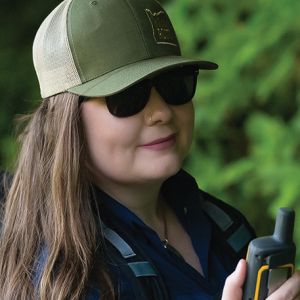
Lara Jacobs is bringing into focus the ecological and pathogenic impacts of outdoor recreation using a cultural impact lens.
Jacobs, who is pursuing her PhD in forest ecosystems and society, works collaboratively with a Tribe in Washington to examine how fecal matter from outdoor recreationists may create issues to the Tribe’s food supply.
Jacobs says that most people do not understand that when they deposit fecal matter in parks and protected areas, it may pose issues to watersheds, soils, and animals, including humans.
“We’ve been taught for years just to dig a hole and bury fecal matter,” says Jacobs. “However, this contrasts with the scientific literature that shows how bacteria survive in great abundance across seasons, and depth of burial doesn’t seem to matter. The best practice isn’t to bury your fecal matter unless you plan to put in a lot of work to completely compost it with soil. Outdoor recreationists should be packing out their fecal waste whenever possible.”
This research is vital for multiple reasons, including the Treaty obligations that the U.S. government holds to manage the Tribe’s non-reservation lands in manners that maintain their natural resources, including subsistence foods.
“This research is also critical because the field of recreation ecology has yet to bring in a cultural impact lens,” says Jacobs.
As a citizen of the Muscogee (Creek) Nation of Oklahoma who also has Choctaw heritage, Jacobs graduated magna cum laude from Oregon State University with a bachelor of science degree in women studies. The degree combined her interests in environmental issues with topics about systems of oppression and privilege. She also holds a master’s degree in environmental studies from Prescott College, focusing on environmental education, conservation science, and sustainability.
After completing her master’s degree, Jacobs wanted to continue researching outdoor recreation science but was more interested in the ecological impacts of outdoor recreation.
“There are five recreation ecology lab groups at universities worldwide, four of which are in the U.S., and one at OSU,” says Jacobs. “Dr. Ashley D’Antonio’s recreation ecology lab group is where the best GIS work is coming from in this field. So, it was a natural choice for me to apply to be in her lab group.”
Her doctoral research centers on the spatial mapping of outdoor recreationists’ behaviors and their associated environmental ecological and pathogenic impacts on Native lands managed by the National Park Service. Jacob’s main objective is to bring an inclusive lens to academia and help transform the academic landscape into a better and brighter place for everyone. While at OSU, she’s worked to build bridges across the college to create spaces for Indigenous students to connect on various topics.
She co-founded the Traditional Ecological Knowledge club and is the current chair and graduate student representative. Jacobs reestablished an OSU chapter of the American Indian Science and Engineering Society and currently serves as president. She is secretary of the Indigenous Grad Student Alliance, and for the past year, she served as a member of the Indigenous Involvement Work Group for the George Wright Society. Jacobs is also a Ford Foundation Predoctoral Fellow, ARCS Scholar, Cobell Scholar, Native Nations Institute Awardee, Helen J. Harold Gilman Smith Scholar and Thurgood Marshall Scholar.
Jacobs says one of the best things about her graduate program has been working with her advisor, Dr. D’Antonio.
“She provides an excellent example for how mentorship of graduate students can occur through positive and supportive interactions,” says Jacobs. “I model my mentoring of students based on her actions.”
During her spare time, Jacobs loves to hike, backpack, kayak, and explore different ecosystems. She also enjoys time with family.
“Family means so much to me, and so does my culture,” says Jacobs. “I work with a cultural guide to connect with my Tribe and spend time learning our Mvskoke language and histories. I also love to create beadwork that is inspired by my people and our connections with the land. In the summer, I spend my time gardening and harvesting foods and medicines. In fall, I spend countless hours canning, drying, and preparing food for my family and Tribal Elders.”
The College of Forestry has supported Jacobs’ education through multiple scholarships, including covering equipment costs for her research.
After finishing her degree, Jacobs aspires to continue working in academia as a professor.
“My dream is to continue building knowledge about how outdoor recreation impacts Tribal Communities and generate more information about recreation impacts in marine systems,” says Jacobs. “I plan to establish a lab group where I can dedicate space and time to mentoring Indigenous students and others from marginalized communities, including allies.”
Indigenous women make up the smallest percentage of assistant, associate, and full professors nationwide (less than one-half of one percent). Jacobs hopes to use her position to show other Indigenous and marginalized people that they, too, belong in the academy and help them realize their potential and achieve their dreams.
A version of this story appeared in the Fall 2021 issue of Focus on Forestry, the alumni magazine of the Oregon State University College of Forestry.

